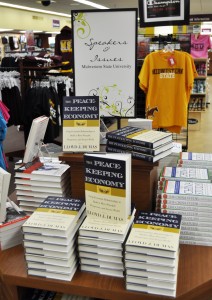
In 2010, the United States budgeted $663 billion to the Department of Defense. This is about half of what the entire world spends on its military, meaning that the U.S. spends roughly as much on defense as the rest of the world combined.
The reason, according to Dr. Lloyd J. Dumas, political economics professor at the University of Texas in Dallas, is that people feel more secure when their country has a strong military.
Dumas will be speaking at 7 p.m. in Akin Auditorium on the global economy and how it can be used as a tool to keep peace in the world. His book, The Peacekeeping Economy, was released about four months ago.
“A lot of people have gotten used to the idea that security lies mainly in military strength,” he said. “They think military strength and national security are almost identical. In fact, security depends mainly on relationships. You don’t have to worry about those with which you have good relationships.”
Dumas recalled the Cold War, when the U.S. was wary of Russia because of its nuclear capabilities. Britain and France both had nukes, too, but neither country was drawn into the conflict – the reason, Dumas said, is that the U.S. had good trade relationships with these countries.
“We had a hostile relationship with the Soviet Union,” he said. “We had a very positive relationship with Great Britain and France.”
Dumas’ main goal of the presentation is to change people’s perceptions of the military.
“I’m trying to shift our focus from thinking about national security primarily as military strength, to think about possibilities for building relationships. In particular, I’m talking about economic relationships that provide real security by tying countries together through mutual benefit.”
The author said people should take a few lessons from the Iraq War, a conflict that has cost the U.S. about $1 trillion and the benefits of it are still being argued by the American people. It may have also been fought under false pretenses – the armed forces unearthed no weapons of mass destruction in the United States,” he said.
Moreover, war is generally not the best option for resolving world conflicts.
“Military actions are very costly and often very ineffective in terms of building security for us,” Dumas said.
But that doesn’t mean there isn’t ever a time for war.
“Military is an important last resort,” Dumas said. “There are times when you can’t avoid military action because everything else has failed.”
In the late 1930s, Dumas said, Adolf Hitler was hell-bent on starting a war.
“They had to be stopped and there was no other way to stop him than with military force,” he said.
Sometimes war is an appropriate measure, Dumas said, but it’s extremely costly to countries in the form of money and human life.
“Military spending for high levels for long periods of time has put a real drag on our economy,” he said. “It’s one of the reasons we’ve lost competitiveness in our industries.”
United States military forces rely on high-technology weaponry – in fact, about 30 percent of American scientists and engineers work in military weapons research.
“That has reduced the flow of civilian research,” he said. “It has taken 30 percent of our scientists and engineers to look for military answers to military questions, like how to make a guidance system bring a warhead closer to a target.”
These same engineers could be researching how to improve other American products, such as automobiles.
“We’re going to have to redirect the talents of some of those engineers and scientists into civilian technological research – then we can produce an industrial renaissance in the United States,” he said.
An important first step for the U.S. government will be to cut military spending, Dumas said. Then it needs to start building mutually beneficial financial relationships with other countries. But this task may be a bit more daunting than some people realize.
“You can’t just say, ‘We’re not going to have any trade barriers and that will do the magic,’” he said. “They have to be the right kind of trade relationships.”
Dumas gave an example of a bad relationship: Israel and Palestine.
“They can close the border any time they want,” Dumas said. “They can build up walls. They have all the cards in their hands. And when they close the borders down, they create chaos and terrible suffering in Gaza.”
He said it’s also an example of a relationship that doesn’t encourage peace.
Building good world relationships doesn’t just fall in a country’s lap, he said. It takes strategy and hard work.
“It’s not magic and it’s not tactics,” he said. “It’s a strategy for creating a world in which there are so many interests against fighting wars that wars become much, much less common.”
Dumas said President Obama’s plan of giving tax credits to companies that don’t outsource to other countries is a quick fix but not a real solution.
“The problem is American industry is not as efficient as it needs to be,” he said. “If we want to pay decent workers and keep job in the United States, we have to be able to produce more efficiently. The only way we’re going to do that is by improving our commercial technologies.”
Plus, any tax credit offered to big companies would need to be significant, Dumas said.
“We’re going to have to pay them a hell of a subsidy and we’re going to have to pay it for a long time,” he said. “That’s not the best route to take.”















